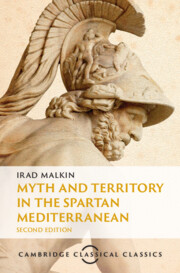Book contents
- Frontmatter
- Dedication
- Contents
- Maps
- Foreword
- Acknowledgements
- Abbreviations
- Note
- Introduction to the Second edition
- Introduction
- 1 The ‘colony of the Dorians’ and the Return of the Herakleidai
- 2 The Homeric king of Sparta: Menelaos in a Spartan Mediterranean
- 3 Spartan colonization in the Aegean and the Peloponnese
- 4 Taras: native hostility, territorial possession, and a new-ancient past
- 5 Foundation and territory: the cults of Apollo Karneios and Zeus Ammon
- 6 Myth and colonial territory: Libya
- 7 Promises unfulfilled: Dorieus between North Africa and Sicily
- 8 Myth and decolonization: Sparta’s colony at Herakleia Trachinia
- Bibliography
- Index
Introduction
Published online by Cambridge University Press: 31 October 2024
- Frontmatter
- Dedication
- Contents
- Maps
- Foreword
- Acknowledgements
- Abbreviations
- Note
- Introduction to the Second edition
- Introduction
- 1 The ‘colony of the Dorians’ and the Return of the Herakleidai
- 2 The Homeric king of Sparta: Menelaos in a Spartan Mediterranean
- 3 Spartan colonization in the Aegean and the Peloponnese
- 4 Taras: native hostility, territorial possession, and a new-ancient past
- 5 Foundation and territory: the cults of Apollo Karneios and Zeus Ammon
- 6 Myth and colonial territory: Libya
- 7 Promises unfulfilled: Dorieus between North Africa and Sicily
- 8 Myth and decolonization: Sparta’s colony at Herakleia Trachinia
- Bibliography
- Index
Summary
A verse of the Midrash, commenting on the quarrel of Cain and Abel, says that the sons of Adam inherited an equal division of the world: Cain the ownership of all land, Abel of all living creatures – whereupon Cain accused Abel of trespass.’ Bruce Chatwin filled his notebooks with references like this to illustrate the two alternatives of human social existence: nomadism and sedentary life. The connection of an organized, sedentary community with the land is never self-evident; images and metaphors are needed to invoke it. Abel roamed the land and struck no roots in it, while for Cain all land became his possession, his ’territory’. Whether one is perceived as autochthonous (’as old as the moon’ like the ancient Arkadians), or as a late-comer who ’strikes roots’ in a place, both images attempt to link two inherently distinct elements – man and the land he inhabits. Often, the connection is in need of further articulation, answering such basic questions as: Why here? Why us? Were we always here and, if not, when did we come, and why? Did our settlement involve conquest and displacement of others? And so on. The aim of this book is to discuss the way myth was used in the ancient Greek world to answer such questions, mediating between the Greek city-states and the territories they inhabited, colonized, or aspired to possess.
Information
- Type
- Chapter
- Information
- Myth and Territory in the Spartan Mediterranean , pp. 1 - 14Publisher: Cambridge University PressPrint publication year: 2024
